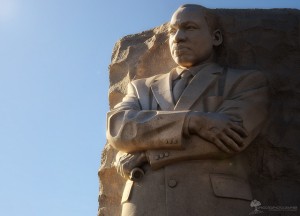Essay: How To Teach Brown V. Board To A Class Of All Black Students
Editor’s note: As schools around the country celebrate the Martin Luther King, Jr. birthday holiday, we’re reposting this essay from former South Florida teacher Jeremy Glazer about race in education.
Here’s a question: How do you teach a class of all black students in an all black school that Brown v. Board of Education ended segregation decades ago?
That isn’t a hypothetical question, but one I remember clearly asking myself. I was teaching American History for the first time in one of our nation’s many embarrassingly homogeneous schools. I could not, with a straight face, teach my students that segregation had ended. They’d think that either they or I didn’t know what the word segregation meant. 
But, as a beginning teacher, I was afraid of telling too much truth. Brown’s legacy is not a hopeful story about law, or government, or progress, and it seemed like a particularly cruel lesson in power, racism, and injustice. I wanted to be both honest and gentle to my students and probably failed at both.
I bumbled my way through that particular year in that particular school, but the question of segregation comes up again and again for me. Brown has always been in the background, whatever my students look like.
And they’ve looked very different. I have been privileged to teach in a wide range of environments—city schools, suburban schools, public schools, and private—and I’ve worked with a wide range of students. In my travels I have found that mixed schools are exceedingly rare. That’s unfortunate because if we are ever going to be a truly multicultural, tolerant society, we need to start by sitting next to each other.
But proximity itself isn’t the answer, it’s just the beginning. Real mixing doesn’t automatically happen even if different students are brought together. I learned this lesson in a suburban school filled with a range of ethnic groups. There I had an English class of mostly black and brown students first thing in the morning. I could never get them to listen to the announcements and one day I asked why they weren’t interested in the events going on in the school.
One kid told me, “Those things aren’t for us. Those are for the other kids.”
It was clear he meant the middle-class white kids, and that even though Brown had succeeded in desegregating this school in body, we had failed to do so in spirit.
I continue to believe in the ideals behind Brown, which I think call for a truly democratic, equitable, public school system. That doesn’t just mean putting different kinds of kids near each other. Physical desegregation is only the first of many steps. There’s a lot of work after that. But the longer we put off that first step, the further behind we fall.
In education, I see too many people looking to find silver bullets in vouchers, charter schools, or court decisions. There are no silver bullets. Schools can be a beacon, but more often they are a mirror. They show us who we are. As long as we live in a country where most of us only spend time with those who look like us, segregation remains a nightmare from which our schools cannot wake us.
If we truly want to desegregate, then those of us with the power to choose need to decide that we no longer want to live separate, unequal lives.
It’s never too late to start.
Jeremy Glazer is a former South Florida school teacher. He’s working on a doctorate in education at Stanford University.
This essay was adapted from a chapter: Glazer, J. (2012). “Teaching Brown v. Board of Education in Segregated Classrooms.” In Wynne, J., Delpit, L. & Miles, R. (eds.) (2012). Confessions of a white educator: Stories in search of justice and diversity. Kendall Hunt.

